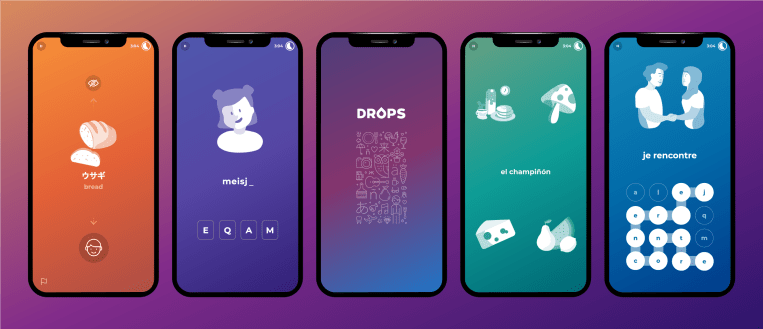
After raising $215 million from SoftBank to double down on the surge of interest in online learning, Kahoot has made an acquisition to expand the scope of subjects that it covers. The popular startup, which lets people build and share educational games, has picked up Drops, a startup that helps people learn languages by way of short picture- and word-based games. The plan is to integrate more Kahoot features into Drops’ apps, and to bring some of Drops’ content into the main Kahoot platform.
Kahoot, which trades a part of its shares through Norway’s alternative exchange the Merkur Market and currently has a market cap of over $3 billion, said in an announcement that it would pay $31 million in cash, plus up to $19 million more in cash and shares, based on Drops meeting certain targets between now and 2022. The deal is expected to close this month.
Drops makes three main apps. First in an eponymous freemium app, with free and paid features, that helps adults learn new languages, currently some 42 in all, with a focus on vocabulary, built around five-minute, “snackable” sessions. A second app, Scripts, is aimed at learning to read, write and sign, and it covers four alphabets and four character-based writing systems. A third, Droplets, is aimed specifically at language learning for learners aged between eight and 17. Altogether Drops has clocked up 25 million users.
Notably, one reason it might be off TechCrunch’s (and the startup world’s) radar is that it appears to have been bootstrapped up to now. (We are confirming that detail and will update when/if we learn more.) But it’s had some notable accolades, getting named app of the year by Google in 2018, for one.
The startup was founded in Estonia and has 21 employees and has no “head office” as such, with the team spread across Estonia, US, UK, Spain, Italy, France, Germany, Sweden, the Netherlands, Hungary, Ukraine and Russia. This could be one reason why it’s kept costs low: in 2019 it reported gross revenues of $7.5 million (€6.3 million), with cash conversion of 40%.
For some more context, Kahoot says that in the last 12 months, more than 1 billion participating players in over 200 countries attended over 200 million Kahoot! sessions. That figure includes both educational users of its free services, as well as enterprises, which pay to build and use games (for example related to professional development or business compliance) on the platform.
“We are thrilled to welcome Drops to the expanding Kahoot! family as we advance towards our vision to become the leading learning platform in the world,” said Eilert Hanoa, the CEO of Kahoot, in a statement. “Drops’ offerings and innovative learning model are a perfect match to Kahoot!’s mission of making learning awesome through a simple, game-based approach. Drops and language learning becomes the latest addition to our growing offering of learning apps for learners of all ages and abilities. We will continue to expand in new areas to make Kahoot! the ultimate learning destination, at home, school or work, and to make learning awesome!”
The Covid-19 pandemic has led to a bonanza for educational apps, which are collectively seeing a huge rush of usage in the last year.
For students, educators and parents, they have become a way of connecting and teaching at a time when physical schools are either closed, or drastically curtailed in what they can do, in order to help limit the spread of the novel coronavirus.
Businesses and other organizations, on the other hand, are leaning on e-learning as a way of keeping connected with staff, engaging them, and training them at a time when many are working from home.
It might seem ironic that at a time when travel has been drastically limited, if not completely halted altogether, for many of us, that language learning has seen an especially big boom.
Maybe it’s about making hay — that is, using the moment to get yourself ready for a time in the future when you might actually get to use your newly acquired foreign language skills. Or maybe it’s just another option for distracting or occupying ourselves in a more constructive way. Whatever might be the motivation or cause, the effect is that language learning is on the up.
Most recently, Duolingo — which incidentally also uses game-based concepts, where you enter a leaderboard for your learning and your daily sessions become winning streaks — raised $35 million on a $2.4 billion valuation, a huge jump for the company.
Kahoot cites figures that predict that digital language learning will be an $8 billion+ market by 2025 as describes Drops as “one of the fastest-growing language platforms in the world.”
“The entire Drops team has spent the last five years building a new way to learn language, and we’re just getting started,” said Daniel Farkas, co-founder and CEO, Drops, in a statement. “We’ve introduced millions of users across the globe to our playful, dynamic approach to language learning. Kahoot! is doing the same for all types of learning. We’re excited to work with such a mission-aligned company to introduce the Drops platform to game-loving learners everywhere.”






















